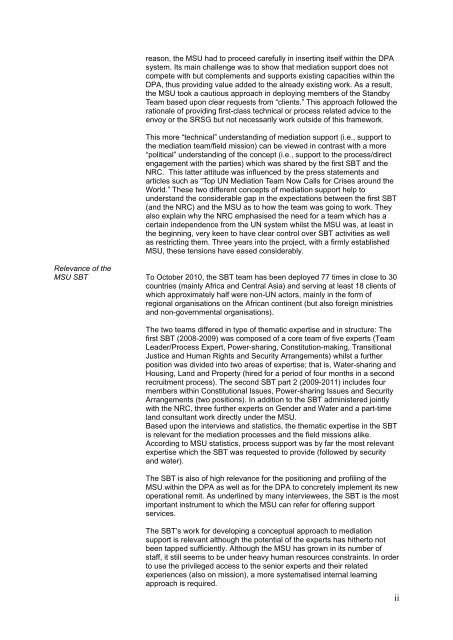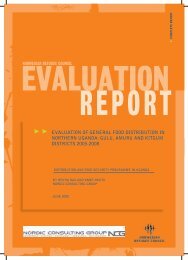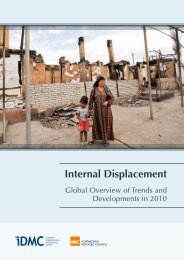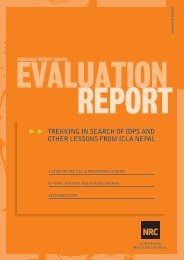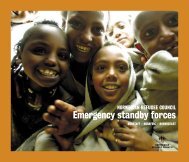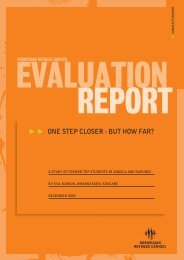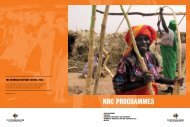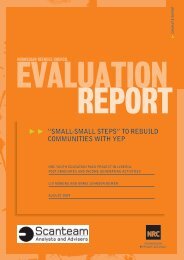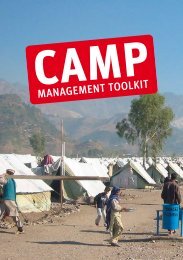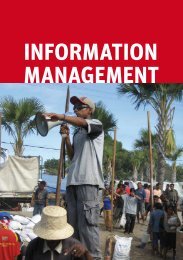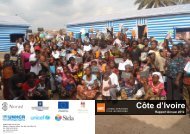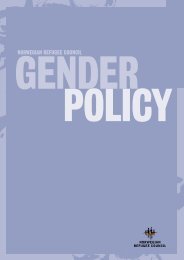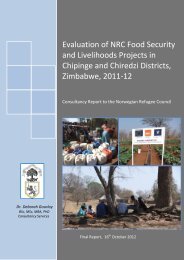Download report here - Norwegian Refugee Council
Download report here - Norwegian Refugee Council
Download report here - Norwegian Refugee Council
- No tags were found...
You also want an ePaper? Increase the reach of your titles
YUMPU automatically turns print PDFs into web optimized ePapers that Google loves.
eason, the MSU had to proceed carefully in inserting itself within the DPAsystem. Its main challenge was to show that mediation support does notcompete with but complements and supports existing capacities within theDPA, thus providing value added to the already existing work. As a result,the MSU took a cautious approach in deploying members of the StandbyTeam based upon clear requests from clients. This approach followed therationale of providing first-class technical or process related advice to theenvoy or the SRSG but not necessarily work outside of this framework.This more technical understanding of mediation support (i.e., support tothe mediation team/field mission) can be viewed in contrast with a morepolitical understanding of the concept (i.e., support to the process/directengagement with the parties) which was shared by the first SBT and theNRC. This latter attitude was influenced by the press statements andarticles such as Top UN Mediation Team Now Calls for Crises around theWorld. These two different concepts of mediation support help tounderstand the considerable gap in the expectations between the first SBT(and the NRC) and the MSU as to how the team was going to work. Theyalso explain why the NRC emphasised the need for a team which has acertain independence from the UN system whilst the MSU was, at least inthe beginning, very keen to have clear control over SBT activities as wellas restricting them. Three years into the project, with a firmly establishedMSU, these tensions have eased considerably.Relevance of theMSU SBT To October 2010, the SBT team has been deployed 77 times in close to 30countries (mainly Africa and Central Asia) and serving at least 18 clients ofwhich approximately half were non-UN actors, mainly in the form ofregional organisations on the African continent (but also foreign ministriesand non-governmental organisations).The two teams differed in type of thematic expertise and in structure: Thefirst SBT (2008-2009) was composed of a core team of five experts (TeamLeader/Process Expert, Power-sharing, Constitution-making, TransitionalJustice and Human Rights and Security Arrangements) whilst a furtherposition was divided into two areas of expertise; that is, Water-sharing andHousing, Land and Property (hired for a period of four months in a secondrecruitment process). The second SBT part 2 (2009-2011) includes fourmembers within Constitutional Issues, Power-sharing Issues and SecurityArrangements (two positions). In addition to the SBT administered jointlywith the NRC, three further experts on Gender and Water and a part-timeland consultant work directly under the MSU.Based upon the interviews and statistics, the thematic expertise in the SBTis relevant for the mediation processes and the field missions alike.According to MSU statistics, process support was by far the most relevantexpertise which the SBT was requested to provide (followed by securityand water).The SBT is also of high relevance for the positioning and profiling of theMSU within the DPA as well as for the DPA to concretely implement its newoperational remit. As underlined by many interviewees, the SBT is the mostimportant instrument to which the MSU can refer for offering supportservices.The SBT s work for developing a conceptual approach to mediationsupport is relevant although the potential of the experts has hitherto notbeen tapped sufficiently. Although the MSU has grown in its number ofstaff, it still seems to be under heavy human resources constraints. In orderto use the privileged access to the senior experts and their relatedexperiences (also on mission), a more systematised internal learningapproach is required.ii


